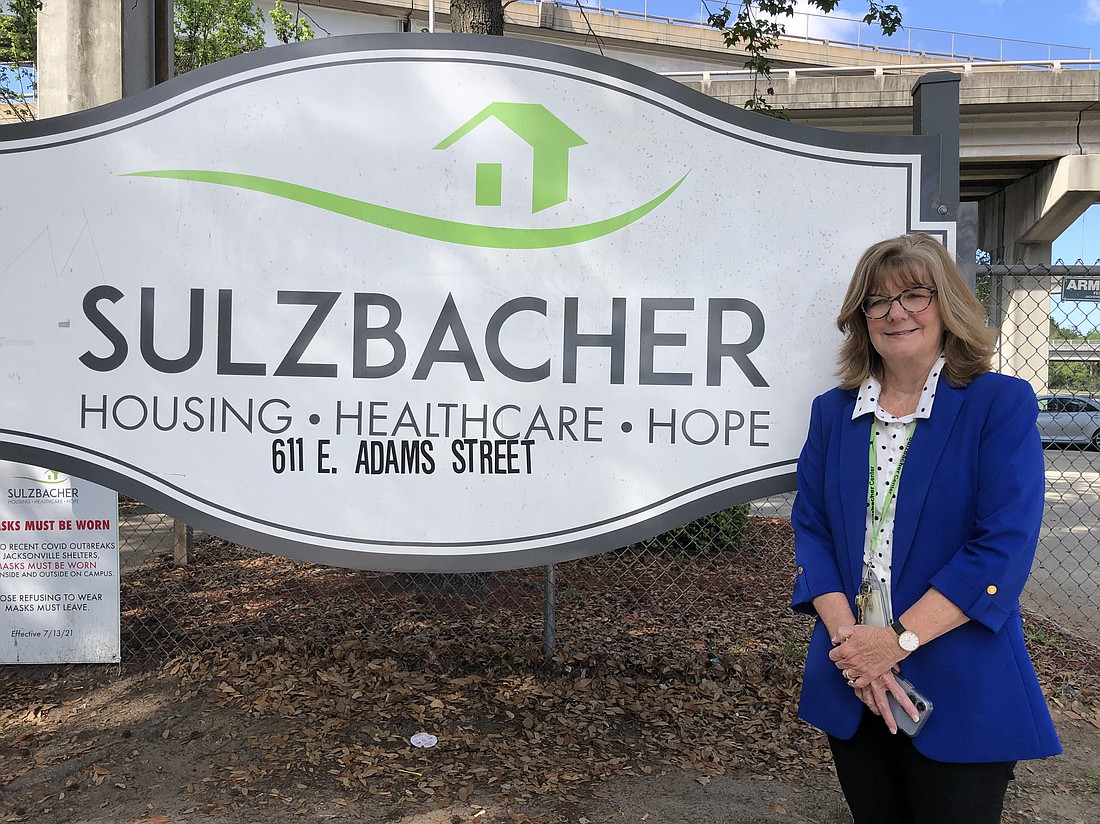
Sulzbacher is leaving the shelter business.
Cindy Funkhouser, president and CEO of the nonprofit homelessness services provider, said the Jacksonville group is commonly seen as “just a shelter.”
But it has been expanding its housing and social services for years.
It also is continuing its plan to relocate from Downtown, where it has been since 1995.
Sulzbacher operates at 611 E. Adams St., where it provides 80 emergency beds for men, along with services such as meals and medical and behavioral health care.
It is near the Duval County Jail and the Maxwell House Coffee plant.
From 100 to 150 people come to the campus each day, Funkhouser said.
The most visible sign of its efforts to leave is the $21 million Sulzbacher Village, which opened in Brentwood nearly five years ago.
That community is at 5455 Springfield Blvd., where the organization provides transitional housing and services to women and families experiencing homelessness.
Sulzbacher Village was Step 1.
Sulzbacher Enterprise Village for homeless men is Step 2.

The proposed $46 million project on about 17 acres in Northwest Jacksonville continues the group’s effort to provide housing, social services and jobs to the homeless.
“We want to build affordable housing because that’s the answer to homelessness. We’re not looking to build another shelter,“ Funkhouser said.
Sulzbacher hopes to break ground by year-end 2023 on the start of the three-phase project on Walgreen Road west of Interstate 95 and east of Brentwood Golf Course.
The first phase of Enterprise Village is housing: 100 studio and one-bedroom units and 80 temporary emergency units.
The second is a center for job skills training for residents and the community, and a community health clinic.
The third is an on-site manufacturing facility for the people Sulzbacher serves.
Sulzbacher is putting financing sources in place for the first phase, “and we are pretty far along on that,” Funkhouser said.
It is negotiating with a for-profit manufacturing company in Boise, Idaho, though it is too soon to say much more about that, she said.
Her hope is that the housing facility will be completed in 2024, the job training center and clinic by 2024 or 2025, and the manufacturing site by the end of 2025.
Sulzbacher will maintain a Downtown presence, but not as a shelter.
“This is just not the right location for us anymore,” Funkhouser said. “It’s going to take some getting used to, but we’re not abandoning people. We’re working to make sure that there will still be the services available, but the model will just look a little different.”
Sulzbacher is planning how it will continue to contribute to meals with partner agencies in the urban core, and to reestablish the Urban Rest Stop now at the Downtown campus.
The Urban Rest Stop is a joint venture of Sulzbacher and the Mental Health Resource Center that provides services to the homeless such as showers, laundry, mail service, lunch and dinner, health care and employment assistance.
Sulzbacher expects to expand its “mobile capability” to the community through its two service buses, Funkhouser said.
Its healthmobile, which was launched in March 2020, offers medical and behavioral health services to the homeless.
Sulzbacher launched its social services bus, which provides access to a housing case manager and benefits processor, in February.
During the coronavirus pandemic, many homeless people left Downtown and moved to other areas of Jacksonville, including Arlington, the Beaches, the Northside and Westside, Funkhouser said.
The fundamental reason: Downtown became somewhat of a ghost town during the pandemic, and homeless people “moved out to where the people were,” she said.
The migration continues.
The mobile units “are critical to how we are going to operate,” she said.
“It helps Sulzbacher to meet people where they are.”
Sulzbacher plans to provide a shuttle bus during the day to transport homeless people from Downtown to Enterprise Village for access to health care and job training.
“People will still be on our campus getting services,” Funkhouser said.
“We are going to make sure that people have someplace to go during the day,” which would also help curb the homeless presence Downtown in such areas as James Weldon Johnson Park.
“That’s also why reestablishing the Urban Rest Stop, in partnership with our other homeless services providers, is so important, so that there will still be a place for people to go during the day,” she said.
Funkhouser said Sulzbacher is in discussion with the other providers for “how that will look.”
She said the site will be Downtown, in or near the Urban Core.
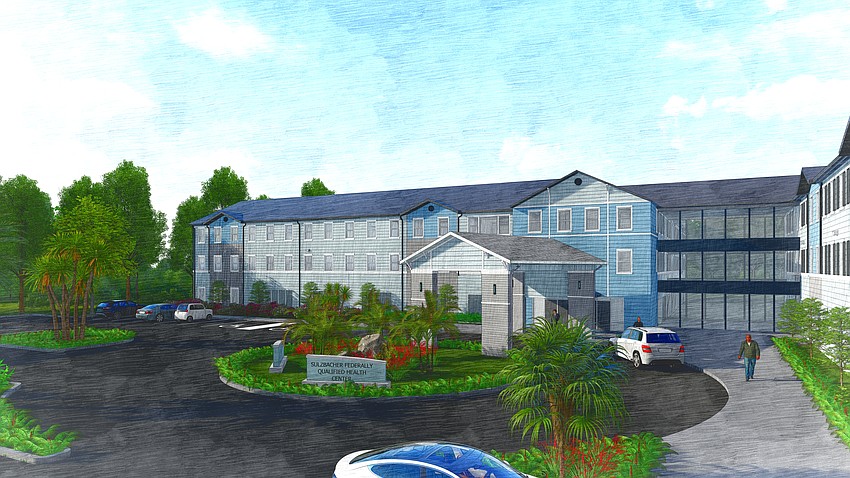
Sulzbacher leases its Downtown location from the city of Jacksonville. About five years remain on the 35-year lease.
The campus is a block north of the Duval County Jail at 500 E. Adams St. and a half-mile north of the Maxwell House coffee plant at 1406 E. Bay St.
The site is in a flood zone, Funkhouser said.
In heavy rain, water from Adams and Forsyth streets and McCoys Creek converge, and the Sulzbacher campus floods.
More than 100 clients had to be evacuated to American Red Cross shelters during the last three hurricanes, Funkhouser said.
The property is also in the Downtown Sports and Entertainment District near TIAA Bank Field, where work is progressing on Jacksonville Jaguars owner Shad Khan’s plans for a proposed Four Seasons Hotel and residences and an office building a few blocks away.
“The desire of the community is to move the jail, so it really doesn’t make sense for us to be here anymore,” Funkhouser said.
“We went to the city. They didn’t come to us. They didn’t say ‘we want you out,’ nothing like that. We went to them and said we want to move because we want to build affordable housing because that’s the answer to homelessness,” she said.
For more than 10 years, the best practice nationally around homelessness has been housing first, compared with prior approaches that focused on solving the homeless problem by “fixing the person first,” Funkhouser said.
“You want to get someone to housing as quickly as possible and then give them all the wraparound services,” she said.
“Whatever it is (they need), we’re working to do three things: income, housing, health care. A person needs all of those things,” she said.
“So that’s really how we work. We want to get someone into housing, but we want to make sure that we’re stabilizing that person and addressing their barriers.”
Sulzbacher has 80 emergency beds at its Downtown facility.
“There are a lot of people on the street that don’t want to come into a shelter. But they would go into permanent housing,” Funkhouser said.
“A lot of people aren’t going into shelter. It might be because they have a mental illness. It might be because they have a substance abuse. (Or) they’re just afraid. There are people that shelter is not a good fit for them. But housing is a good fit for everybody.
“So we basically need to get them into their own housing. That’s the thought, that’s our strategy, and that’s our mission.”
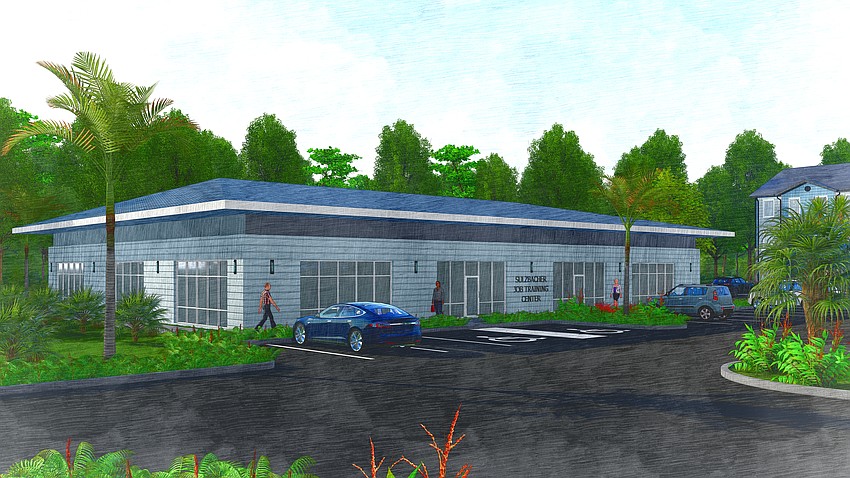
Jacksonville City Council signed off on a rezoning request June 28, 2022, for the proposed Enterprise Village campus.
It rezoned the property from light industrial and commercial community general to planned unit development that allows residential development.
Plans show the campus will include a 60,000-square-foot administration building with short-term housing; 60,000 square feet of transitional workforce housing; a 45,000-square-foot community clinic and respite care building; and a 7,600-square-foot center for job skills training.
The design also shows a 100,000-square-foot building designated for a new manufacturing facility that will provide employment for Sulzbacher clients and others in the community.
The concept for Enterprise Village was already on the drawing board when Sulzbacher Village opened in 2018, Funkhouser said.
The model was built with the affordable housing crisis in mind and putting people in housing first, Funkhouser said.
Building housing units at Sulzbacher Village, and adding services later, has “worked fabulously. This model (for Enterprise Village) has been kind of a progression,” Funkhouser said.
Sulzbacher is working with Florida State College at Jacksonville and Goodwill Industries of North Florida for the job skills training that is part of Phase 2,” she said.
For Phase 3, Sulzbacher is negotiating with a for-profit manufacturing company in Boise, Idaho, that builds components for modular workforce housing to open a facility at Enterprise Village.
The manufacturing component is separate from the $36 million cost for Phase 1 and Phase 2 of Enterprise Village, which have estimated costs of $26 million and $10 million, respectively.
Funkhouser estimated last year that the manufacturing facility will cost about $10 million.
Sulzbacher looked at several types of products to make, Funkhouser said.
“What product do we want to try to make? Where is there a need? And what would be a good skill set that would give someone not just a living wage job, but a job where there’s a chance of making more money as you go along?“
People working there will be learning a variety of skill sets, such as framing, drywall, electrical and plumbing, to become tradesmen, she said.
Sulzbacher is working with residential developer The Vestcor Companies for the workforce housing.
“Vestcor told me ‘the product you are actually making are workers for the construction industry. That’s your product. Employees that you’re developing that can now go out and work for a builder and make very good money doing any of those trades,’” Funkhouser said.
At the same time, “We’re building affordable housing that can be pieced together to make multifamily or duplexes, or quads or single,” she said.
The concept that a formerly homeless person is “now helping to solve the affordable housing crisis by building housing - I think that it’s full circle,” Funkhouser said.
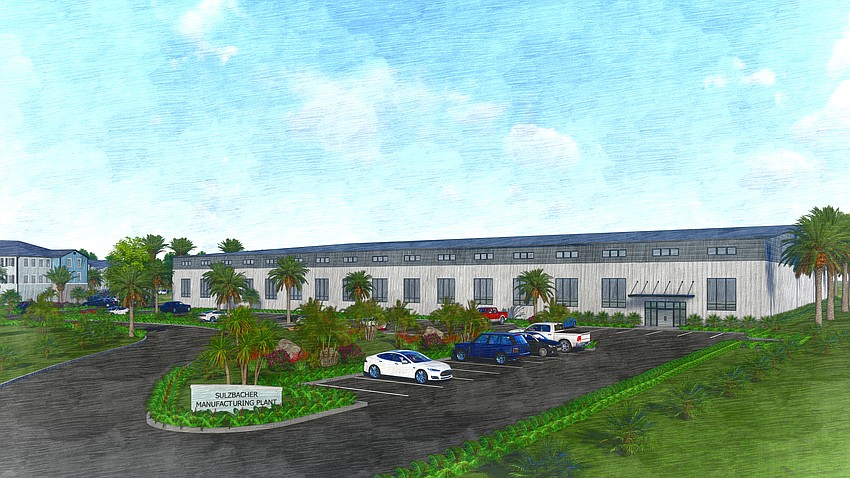
Sulzbacher is “pretty far along” in putting together state and federal financing for Enterprise Village, Funkhouser said.
She said Sulzbacher applied for $28 million in U.S. Department of Housing and Urban Development Low-Income Housing Tax Credits and accompanying funding.
That’s after Council unanimously approved Jan. 24 a $12 million forgivable loan for the Sulzbacher project with money provided by HUD through the American Rescue Plan Act of 2021.
Council members approved the $12 million appropriation in an emergency vote on Ordinance 2023-21.
The state money will allow Sulzbacher to apply for the 9% tax credits as opposed to 4% tax credits, according to the legislation.
According to the HUD website, the federal Low-Income Housing Tax Credit program has an $8 billion annual budget to give state and local agencies the authority to issue tax credits for acquisition rehabilitation, or new construction of rental housing targeted to lower-income households.
The Council ordinance appropriates $12,060,074 the city received from the Home Investment Partnerships Grant-American Rescue Plan program meant to provide homelessness assistance and services. The city will keep $60,074 to pay for administrative costs to oversee the forgivable loan agreement and disperse the money to Sulzbacher.
Sulzbacher is working on the underwriting of $16 million in tax credits to help finance the first phase of the project, Funkhouser said.
It plans to have the information for the application to the Jacksonville Housing Finance Authority by June.
“We are still looking to fill a $4 million to $5 million gap for Phase 1, and we have applied for various other grants and funding that we’re waiting to hear back on,” she said.
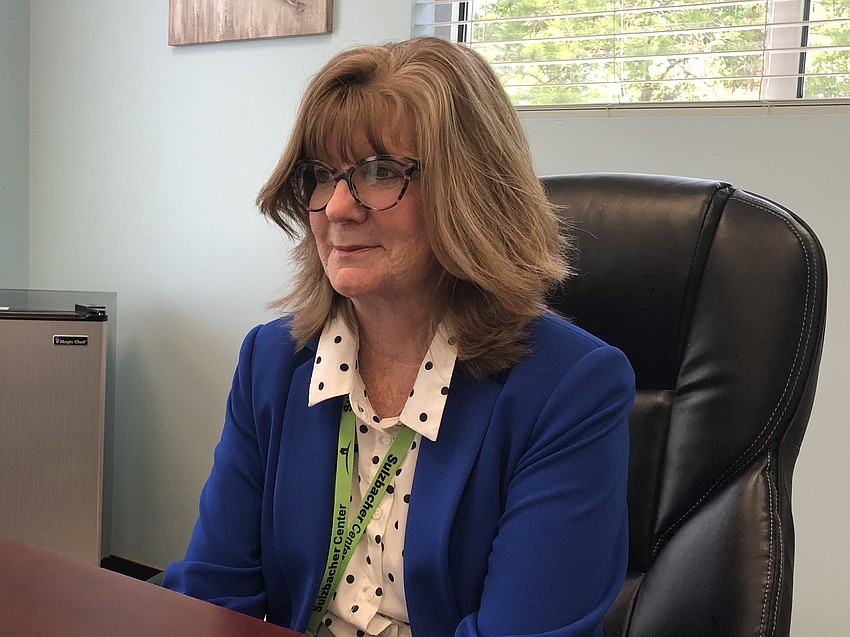
Sulzbacher’s plan to bring Enterprise Village to Northwest Jacksonville met resistance when it was announced last year.
Neighborhood residents voiced objections to having a homeless center nearby, equating it with rising crime and lower property values.
Funkhouser anticipated the concerns.
The response echoed those expressed when the group announced plans to bring Sulzbacher Village to Brentwood.
“People basically say, we don’t want you here, not in my backyard. And it doesn’t just apply to Sulzbacher, it applies to any affordable housing anywhere in the city where people are trying to build it,” she said.
Sulzbacher Village brought in housing for homeless women and families, but it also brought in services such as a pediatric clinic, an early learning center and an after-school program, all of which are open to the community.
“Now the community is very accepting of us. It’s a beautiful facility, with very well kept up, beautiful grounds,” Funkhouser said.
For Enterprise Village, Sulzbacher, working with District 8 Council member Ju’Coby Pittman who represents residents in the area, held community meetings to help reduce concerns.
The job training center that is part of Phase 2, for example, will be open to the community.
“That’s the other piece of this. Where we’re building is an area that needs so many resources. It’s 32209. That particular ZIP code has the highest crime rate, it has the highest unemployment rate, it has the highest infant mortality rate,” Funkhouser said.
“To be able to bring health care, and to be able to bring job training, and jobs, and affordable housing – all those things are needed in that area, so that was definitely a deciding factor.
“We wanted to be in an area where we would be a benefit to the area, just like we are with the first Village.”